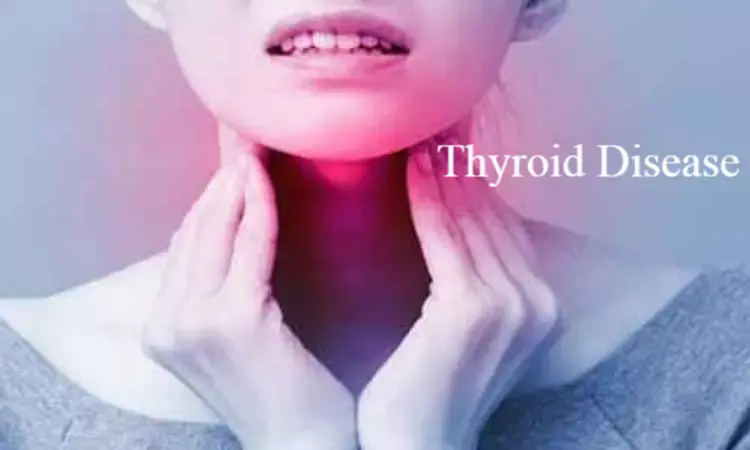- Home
- Medical news & Guidelines
- Anesthesiology
- Cardiology and CTVS
- Critical Care
- Dentistry
- Dermatology
- Diabetes and Endocrinology
- ENT
- Gastroenterology
- Medicine
- Nephrology
- Neurology
- Obstretics-Gynaecology
- Oncology
- Ophthalmology
- Orthopaedics
- Pediatrics-Neonatology
- Psychiatry
- Pulmonology
- Radiology
- Surgery
- Urology
- Laboratory Medicine
- Diet
- Nursing
- Paramedical
- Physiotherapy
- Health news
- Fact Check
- Bone Health Fact Check
- Brain Health Fact Check
- Cancer Related Fact Check
- Child Care Fact Check
- Dental and oral health fact check
- Diabetes and metabolic health fact check
- Diet and Nutrition Fact Check
- Eye and ENT Care Fact Check
- Fitness fact check
- Gut health fact check
- Heart health fact check
- Kidney health fact check
- Medical education fact check
- Men's health fact check
- Respiratory fact check
- Skin and hair care fact check
- Vaccine and Immunization fact check
- Women's health fact check
- AYUSH
- State News
- Andaman and Nicobar Islands
- Andhra Pradesh
- Arunachal Pradesh
- Assam
- Bihar
- Chandigarh
- Chattisgarh
- Dadra and Nagar Haveli
- Daman and Diu
- Delhi
- Goa
- Gujarat
- Haryana
- Himachal Pradesh
- Jammu & Kashmir
- Jharkhand
- Karnataka
- Kerala
- Ladakh
- Lakshadweep
- Madhya Pradesh
- Maharashtra
- Manipur
- Meghalaya
- Mizoram
- Nagaland
- Odisha
- Puducherry
- Punjab
- Rajasthan
- Sikkim
- Tamil Nadu
- Telangana
- Tripura
- Uttar Pradesh
- Uttrakhand
- West Bengal
- Medical Education
- Industry
Thyroid dysfunction may reduce survival in CHF compared to euthyroid patients: Study

Researchers have found in a new study that Thyroid dysfunction is associated with a reduced survival rate in CHF compared to euthyroid patients.Patients with Hyperthyroidism or Hypothyroidism, when experience cardiac failure are at high risk of mortality compared to patients without thyroid dysfunction, suggests a new study which was published on The American Journal of Cardiology on October 24, 2020.
Subclinical thyroid dysfunction is very common in patients with chronic heart failure but there is conflicting evidence regarding its prognostic significance. A research team with a young researcher Nathan A. Samuel conducted a retrospective study to evaluate the relation between thyroid function and prognosis in a large, well characterized cohort of ambulatory patients with CHF. They included 6,782 patients with chronic HF from the Hull LifeLab registry referred to a community HF clinic from March 2000 to March 2018. among which 90% of patients were euthyroid (TSH:0.35 mIU/L and 4.7 mIU/L), 6% were hypothyroid ( TSH: more than 4.7 mIU/L) and 4% were hyperthyroid (TSH: less than 0.35 mIU/L).
On univariable analysis, the researchers found both hypothyroid patients and hyperthyroid patients had a greater risk of death compared with euthyroid patients. " There was a U-shaped relation between TSH and outcome" Nathan A. Samuel said.
Researchers found a weak but significant association between increasing Thyroid-Stimulating Hormone and outcome (mortality) in patients with heart failure with normal ejection fraction. However, the researchers also found Subclinical hypothyroidism is associated with mortality in univariable analysis, but the association disappears after adjustment for age and natriuretic peptide level.
"It is important to check thyroid function at baseline in patients with newly diagnosed HF since both hypo- and hyperthyroidism can cause HF" Samuel added.
The three strongest predictors of adverse outcome according to researchers were increasing age, increasing NT-proBNP, and higher NYHA class.
The authors concluded, "although thyroid dysfunction is associated with worse survival in patients with CHF, it is not an independent predictor of mortality".
For further information:
https://www.ajconline.org/article/S0002-9149(20)31140-1/fulltext
Medical Dialogues Bureau consists of a team of passionate medical/scientific writers, led by doctors and healthcare researchers. Our team efforts to bring you updated and timely news about the important happenings of the medical and healthcare sector. Our editorial team can be reached at editorial@medicaldialogues.in.
Dr Kamal Kant Kohli-MBBS, DTCD- a chest specialist with more than 30 years of practice and a flair for writing clinical articles, Dr Kamal Kant Kohli joined Medical Dialogues as a Chief Editor of Medical News. Besides writing articles, as an editor, he proofreads and verifies all the medical content published on Medical Dialogues including those coming from journals, studies,medical conferences,guidelines etc. Email: drkohli@medicaldialogues.in. Contact no. 011-43720751


